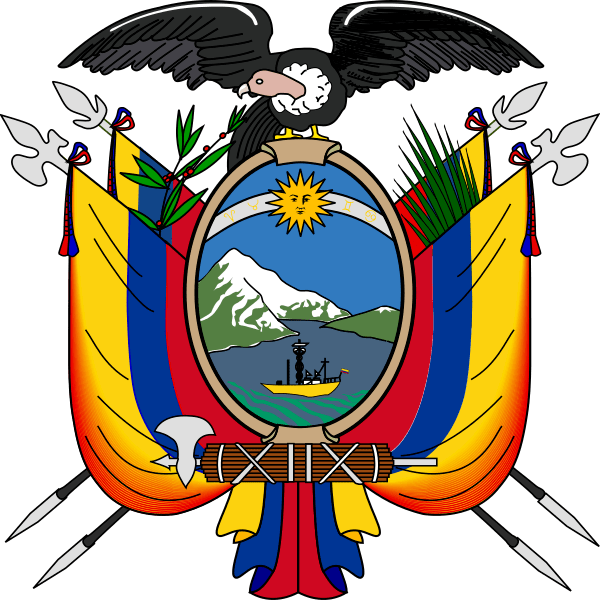- Information
- iGambling
- Surveys
- prev
- next
Population
- Population: 16599593 people.
- Official Language: Spanish
- HDI: 0,765
- Salary: $511
- Poverty rate: 29.9%
- Gini: 45.5%
- The believing population: 68%
- Main religion: Christianity (94.1%)
- Second religion: Atheism (5.5%)
Harmful habits
- Alcohol: 3 litres/year
- Smoking: 11.3%
Internet
- Internet users: 53.5%
- Mobile Internet: 64.3%
- Landline Internet: 34.8%
- Internet speed: 17.7 Mbps
- Country Top Level Domain: .EC
General information about the country
-
Country name:Ecuador
-
Code (2-digit):EC
-
Continent:South America
-
Country level:Tier 2
-
Capital:Quito
-
Country area:283560 sq km.
-
Telephone code:593
-
Currency (code):US dollar (USD)
Geographical features of the country
Administrative division into regions
Province (24): Azuay, Bolívar, Galápagos, Guayas, Imbabura, Cañar, Carchi, Cotopaxi, Los Ríos, Loja, Manabí, Morona Santiago, Napo, Orellana, Pastaza, Pichincha, Zamora Chinchipe, Santa Elena, Santo Domingo de los Tsáchilas, Sucumbios, Tungurahua, Chimborazo, El Oro, Esmeraldas.
Features of the country
The modern territory of the country was partially or completely occupied by the states: Inca Empire, Spanish Empire, Great Colombia, New Granada.
The following rivers flow through the territory: Putumayo.
Ecuador has the following islands: Isabela (Albemarle), Santa Cruz (Indefatigable), Fernandina (Narborough), San Salvador (James), San Cristobal (Chatham), Santa Maria (Charles), Marchena (Bindlo), Española (Hood), Pinta (Abingdon), Baltra, Santa Fe (Barrington).
Mountains present in the territory: Chimborazo, Cotopaxi, Cayambe, Antisana, Altar, Sangay, Ilinsa, Tungarahua, Carihuairazo, Sincholagua, Pichincha, El Corazon, Chiripungu, Cumbal, Chiles, Soroche, Ruminiaui, Patul, Fernandina.
The following volcanoes are present in the territory: Chimborazo, Cotopaxi, Sangay, Fernandina.
Gambling regulation
-
Online casinos:Illegal
-
Online sports betting:Illegal
Read more about regulation
In October 2024, Ecuadorian President Daniel Noboa cancelled a number of decrees adopted in 2023 by the previous president. Among the cancelled regulations was a ban on advertising sports betting and gambling in the media. Now such advertising is once again allowed.
Also under Noboa's decree, the Ecuadorian Internal Revenue Service in July this year created a register of operators engaged in gambling activities, most of which are local companies.
In addition, a 15% gross income tax has been established for all companies, regardless of whether they are based in Ecuador or abroad. In addition, there is a 15% levy on players' winnings.
It should be recalled that the country has an uncertain system of regulation of the gambling sector. Land-based gambling establishments are prohibited, and there is no legal framework for iGaming.
However, both local and international operators are allowed to operate in Ecuador, provided they comply with the tax obligation.
Top brands in the country
Top 10 popular iGaming brands (December 2024):
- Ecuabet
- Betano
- Sportbet
- Doradobet
- Olimpobet
- Novibet
- Bet365
- Betcris
- Latribet
- F0rbet
Top payment systems
- BeMovil
- BIMO
- Visa
- Deuna
- Mastercard
- Mi Negocio Efectivo
- Pagament Ecuador
- PagoEfectivo
Online Gambling in the country
Population
The country has a population of over 18.9 million. 65.5 per cent are urban dwellers. Guayaquil and Quito are Ecuador's largest cities, with a combined population of more than 4 million.
At the beginning of 2024, the population had the following age distribution:
- 10.06% - children under 7 years of age
- 11.74 per cent were adolescents between 8 and 18 years of age.
- 12.06% - youth from 19 to 30 years old
- 42.94 per cent - adults from 31 to 60
- 18,8% - elderly people from 60
- 4.4% - long-livers over 80
By 2075, the elderly population will be more than twice the size of the young population.
The median age is 27 years.
The average life expectancy for men is 75 years and for women 80 years. The total population is 46.9 per cent male and 53.1 per cent female.
Education: 22.6 per cent of Ecuadorians have higher education, incomplete higher education - 4 per cent, secondary technical education - 37.6 per cent, 11 grades - 16.6 per cent, 9 grades - 8.9 per cent, no education - 4.8 per cent, illiterate - 5.5 per cent.
The literacy rate among young people aged 15 to 24 is 99.3 per cent.
Ecuadorians are a Spanish-speaking nation formed in the 20th century. The population is divided ethnically as follows:
- Mestizos (a mixture of Spanish and Native American Indians) - 65 per cent
- Amerindians 25 per cent
- Spaniards - 7 per cent
- Afro-Ecuadorians - 3 per cent
Language: Spanish is the official and most widely spoken language, spoken by 94.7 per cent of the population. Several local indigenous languages such as Quechua and Shuar (3.9 per cent) are also spoken.
In recent years, English has become increasingly common, especially in the major tourist centres.
Religion: about 80% of the country's inhabitants profess Catholicism, 11% are Protestants, 7% are of other religions and atheism.
Major cities: Quito (capital), Guayaquil, Cuenca, Santo Domingo, Ambato.
Currency: US dollar (USD).
Ecuador switched to a new currency in 2000, replacing the Ecuadorian sucre with the U.S. dollar, which became the official currency.
The introduction of the US dollar as the national currency was aimed at reducing inflation and helped to improve financial stability in the state.
Financial capacity
As of 2023, an average of 26% of the population lived below the poverty line, earning less than $5.5 per day.
Meanwhile, about 10% of the population lived in extreme poverty, earning less than $3 per day.
Ecuador's unemployment rate rose to 3.97% in September 2024, up from 3.48% in June 2024.
The average wage is from $400 and minimum wage is from $280.
Mentality
Ecuadorians combine Spanish cultural heritage with indigenous traditions, as the country was part of the Inca Empire and then conquered by the Spanish.
Ecuadorians are very calm and balanced people, despite the long Spanish influence.
Any misunderstandings and conflicts here are solved quickly, without serious scandals, if you do not hurt the pride of the locals. Respect for traditions and customs is of paramount importance to the population.
Sunday service is a key event in the life of an Ecuadorian. Also, priests in the country enjoy authority both among individual residents and in the political sphere of the country. They are often called upon for help in resolving any controversial issues.
Mountains have a spiritual meaning in traditional Ecuadorian religion. The highest mountains in the region are often called Taita, which means ‘father’ in Quechua. Therefore, a favourite theme of Ecuadorians is the country's nature.
One of the most widespread superstitions in the state is connected with the number 13, which residents consider a symbol of bad luck. Also black and purple colours are associated with death.
Status of gambling
Since 2011, land-based gambling establishments have been banned in the country. There is no legal framework for iGaming, creating uncertainty in regulating the sector.
Earlier this year, President Daniel Noboa, elected in November 2023, attempted to regulate the industry by proposing a national referendum that included a question on the establishment of a legal gambling sector.
But the initiative was complicated by the national crisis caused by the escape of drug lord Adolfo Macias from prison, which led to conflict between the authorities and the drug cartels.
To date, there are still no regulations for iGaming. However, local and international operators pay a 15 per cent tax on gross revenue and a 15 per cent levy on player winnings, which allows them to operate in the sector. There are no licence fees.
The country's Revenue Service (SRI) monitors the industry and checks whether offshore and local gambling and betting companies pay taxes through a newly created operator registry. If not, IP addresses of such platforms are blocked.
According to official data, there are around 65 betting companies registered with SRI.
Size of the iGaming market
The size of the gambling sector, including online and offline gambling, is approximately $300 million.
Among all types of gambling, sports betting accounts for approximately 60% of the total market.
In addition, 12% of the adult population participates in online betting on a regular basis.
Internet accessibility
In 2023, about 72.69% of Ecuador's population used the internet.
At the beginning of 2024, the country had 15.29 million internet users and a penetration rate of 83.6%.
According to information and communication technology indicators from Ecuador's National Institute of Statistics and Census, 61.7 per cent of families in urban areas have access to mobile internet and wireless connection via Wi-Fi, while 34.7 per cent of families in rural areas only have access to internet via cable or modem.
The average speed of wireless connection via Wi-Fi is 93.40 Mbps.
The average speed of a mobile internet connection is 12.05 Mbps. In larger cities such as Quito and Guayaquil, speeds can be much higher.
As of 2021, Ecuador did not have 5G network coverage. Analysts note that internet speeds in the country are slower than the global average.
Device usage volume:
- mobile - 85%
- desktop - 13%
- tablet - 2%
Popular web applications: TikTok, Facebook, YouTube, Instagram, LinkedIn, Snapchat.
Number of active users in early 2024:
- TikTok - 12.66 million
- Facebook - 12.5 million
- YouTube - 11.7 million
- Instagram - 6.5 million
- LinkedIn - 4.4 million
- Snapchat - 2.45 million
Player Preferences
Betting on sports, especially football, continues to be the most popular in Ecuador. However, there is a growing interest in cyber sports, tennis and basketball.
Lotteries and similar real-money games such as bingo, scratch cards and keno are in demand among the country's residents.
Slots are gaining popularity. Latin American players prefer to place small but frequent bets.
Data from Blask on online gambling
- Blask data from: 09/01/2024
- Population size: 17 million.
- Brands found: 91
- Active brands: 89
- YoY (Year Over Year): +34.3%
- MoM (Month Over Month): -3.1%
- eFTD: ~290k.
- eGGR: ~$17 million
-
Interest in gambling in the country:

-
Top 5 brands in the country:
- Ecuabet - 84,9%
- DoradoBet - 3,2%
- Betano - 2,3%
- Bet593 - 1,6%
- Olimpobet - 1,2%

Gambling affiliate programmes that accept traffic from this country
- Share
- prev
- next







